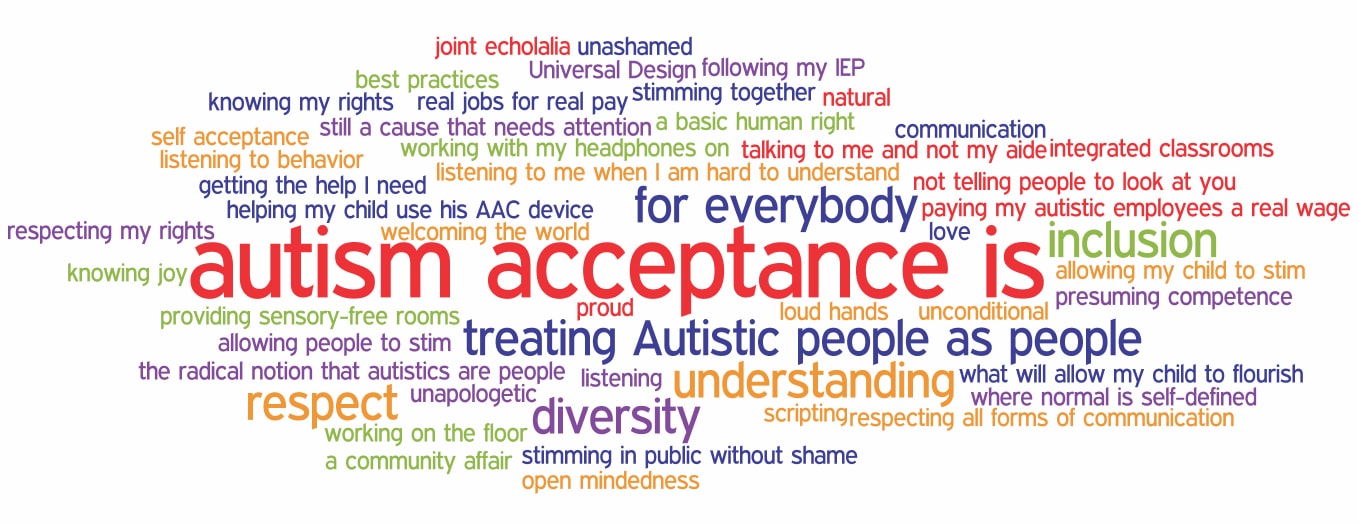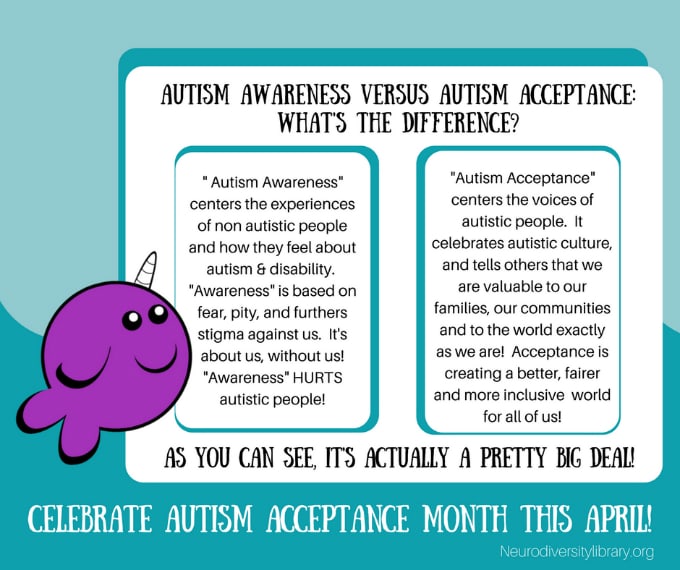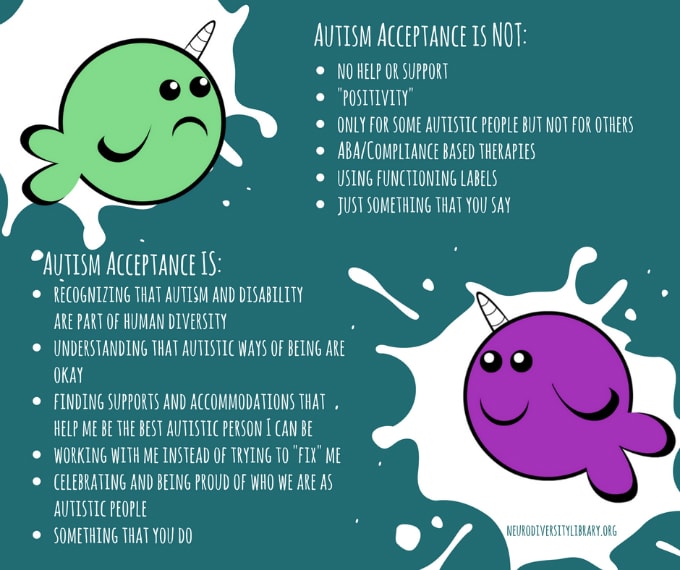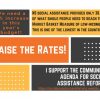KJIPUKTUK (Halifax) – Last year, after several years of celebrating “Autism Awareness Month”, Autism Nova Scotia began observing “Autism Awareness & Acceptance Month”, to include a key initiative of the Autistic community, the people who are actually autistic. Then in October, Autism Canada began observing “National Autism Awareness & Acceptance Month in Canada” as well.

World Autism Awareness Day has been observed on April 2 every year since 2008. It was designated by the United Nations in 2007 with the purpose of raising awareness about autistic people throughout the world.
The thing is, the day was created by non-autistic people. And we actually autistic people, especially the radical activist kind, have been writing about our experiences and raising awareness for a long time, certainly well before World Autism Awareness Day was designated.
Many autistic people, myself included, find the traditional “awareness” campaigns to be insufficient and harmful, because the effect of autism “awareness” is that is ends up promoting fear and stigma against us, and encourages non-autistic people to think about ways they can make us more “normal” or pass as non-autistic.
Most importantly, awareness campaigns place a heavy emphasis on what non-autistic people think about us….it’s about us without us!
In response to the “autism awareness” campaigns, an autistic woman by the name of Paula Durbin-Westby started Autism Acceptance Month in 2011. The concept of autism acceptance has a long history by itself, dating back to as early as 1993 when Jim Sinclair published his seminal essay “Don’t Mourn For Us”. However, most of the traditional awareness campaigns did not acknowledge the autistic community that had been around for a long time.
Awareness vs. Acceptance
Autism awareness and autism acceptance come from completely different mindsets. This essay by Kassiane Asasumasu explains these differences very well:
The gulf between awareness and understanding is as wide as any ocean. Awareness is all about creating a sense of urgency and fear. Awareness efforts present us as a problem to be solved, and yesterday. Awareness operates in stereotypes and soundbites, not real people. Awareness has no substance; it is but a tool to earn more money to fix us and to promote yet more awareness.
Awareness is easy. Acceptance requires actual work.
Acceptance comes from a place of understanding. Understanding isn’t generated by soundbites and poster children. Understanding takes work. To accept us, people first need to acknowledge us as individuals – as three-dimensional, growing, developed characters. We are not all the same, and we are not but a collection of deficits. Acceptance is seeing that – and seeing that one’s distaste for an autistic person is more likely than not because of “autism”. Awareness tells you that anything objectionable about us is “autism”, but that explanation is clear, simple, and wrong.
Acceptance requires facing that which makes you uncomfortable about us, thinking about why it makes you uncomfortable, and confronting any prejudice at the root of that discomfort. To accept us is to make a conscious effort to overcome that prejudice, to recognize that your discomfort with our differences is far more your problem to overcome than ours.
Another good explanation of the differences is this essay by well-known non-speaking autistic activist Amy Sequenzia:
Awareness says: Here is your child. Unfortunately this is a defective child. Maybe, if you work with this kid hard enough, you will be able to have at least a tiny taste of the joys of parenthood. You will need a lot of money. I am sorry for you. Good luck, don’t expect too much.
Acceptance says: Here is your child! Congratulations!
…..
Awareness says: Your child cannot understand human feelings. Your non-verbal child will never say “I love you”.
Acceptance says: Your child processes feelings in a way that might seem odd, but their feelings are real. The love received will come back, sometimes in a non-speaking way.
……
Awareness says: Don’t trust the adults who “have autism”. They are too ‘high-functioning’ to understand the heartbreaking struggles of “real” autism.
Acceptance says: Everyone struggles. Seek your community / your child’s community for input.
…..
See the difference?
Are you Aware of us, or are you striving to Accept us?
Because the two are almost opposite concepts.
Yet another good explanation of the differences between awareness and acceptance is this infographic created by Lei Wiley-Mydske of the Ed Wiley Autism Acceptance Lending Library in Stanwood, Washington.
Celebrating autistic culture, and who we are as autistic people
It’s important to understand what autism acceptance is and what it is not. All too often, when people talk about autism acceptance, they end up talking about autism in ways that sound a lot more like autism awareness.
Using functioning labels, and advocating for Applied Behavioral Analysis (ABA), Intensive Behavioral Intervention (IBI) or other compliance-based “therapies” is not acceptance.
Acceptance is also not about pretending that everything about being autistic is positive, because that’s not true. Just like anyone else, autistic people have challenges, many of which are outside their control.
So what is autism acceptance all about?
It’s about recognizing that autism and disability are a natural part of the human experience. It’s about finding supports and accommodations that help us be the best autistic people we can be. It’s about celebrating autistic culture, and who we are as autistic people.
Most crucial of all, acceptance is not something you say, it’s something you do. As the Autistic Self-Advocacy Network says, “Acceptance is an action”.
So as you can see, autistic people don’t need, or want, awareness. Because most people are already aware of autism! Awareness and acceptance are two completely different concepts. Bringing the two together won’t work, no matter how much the mainstream autism organizations try to say that doing so makes us “better together” or similar platitudes.
So next year, and every year after, let’s ditch the word “awareness” and everything that goes with it, and dive headfirst into autism acceptance.
See also: The autism research that’s really needed
If you can, please support the Nova Scotia Advocate so that it can continue to cover issues such as poverty, racism, exclusion, workers’ rights and the environment in Nova Scotia. A paywall is not an option, since it would exclude many readers who don’t have any disposable income at all. We rely entirely on one-time donations and a tiny but mighty group of dedicated monthly sustainers.





